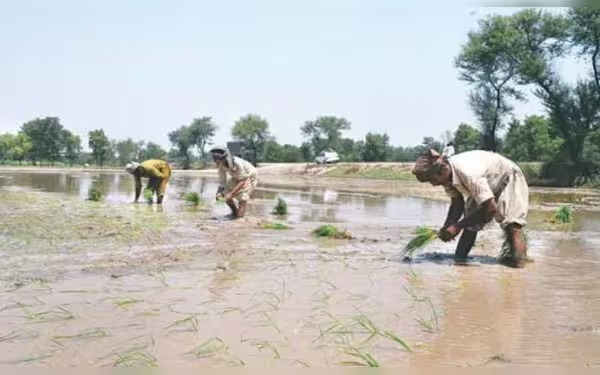Thursday, November 7, 2024 08:40 AM
Punjab Sindh Water Shortage 16% During Rabi Season 2024-25
- IRSA announces 16% water shortage for Punjab and Sindh.
- Chashma Barrage closure approved for effective water management.
- Farmers face challenges due to anticipated water scarcity.
 Image Credits: urdupoint
Image Credits: urdupointIRSA reports a 16% water shortage for Punjab and Sindh during Rabi season 2024-25, impacting agricultural needs and water management strategies.
The Indus River System Authority (IRSA) has recently announced a significant water shortage of 16% for the provinces of Punjab and Sindh during the ongoing Rabi season of 2024-25, which commenced on October 1. This announcement comes after a meeting of the IRSA Advisory Committee, where various stakeholders discussed the anticipated water availability and the challenges posed by the current climatic conditions.
During the meeting, chaired by Abdul Hameed Mengal, the committee reviewed the water situation and approved the expected water availability criteria for the Rabi season. The committee noted that the actual inflows into the river system were slightly higher than previously forecasted, but the overall water availability for the provinces remains a concern. The anticipated inflow at the four Rim-Stations is projected to be 22.98 million acre-feet (MAF), with a shortage of 9.58 MAF expected.
Punjab is set to receive 16.68 MAF, while Sindh will get 12.58 MAF. This distribution reflects a slight increase compared to last year's actual availability, but the overall situation remains precarious. The committee emphasized that the water allocation must be managed carefully to ensure that both provinces can meet their agricultural needs during this critical growing season.
Moreover, the IRSA Advisory Committee discussed the impact of recent heavy rainfall and flooding, which had led to less water utilization by the provinces from August 1 to September 20, 2024. The actual system losses were reported at 11.90 MAF, which is lower than the maximum anticipated losses. This indicates that while the inflows have been better than expected, the overall water management remains a challenge.
In light of these developments, the committee has approved the closure of the Chashma Barrage for 20 days, which may be extended by an additional five days. This closure is essential for maintaining the reservoir levels and ensuring that the water distribution aligns with the needs of the provinces.
As the Rabi season progresses, it is crucial for the provincial governments and the IRSA to work collaboratively to manage the available water resources effectively. The anticipated water shortage poses a significant challenge for farmers and agricultural stakeholders, who rely heavily on consistent water supply for their crops. The situation calls for innovative solutions and adaptive strategies to mitigate the impacts of water scarcity.
The announcement of a 16% water shortage for Punjab and Sindh during the Rabi season highlights the ongoing challenges faced by Pakistan in managing its water resources. As climate change continues to affect weather patterns, it is imperative for authorities to prioritize sustainable water management practices. By doing so, they can ensure that the agricultural sector remains resilient and capable of meeting the food demands of the nation.













